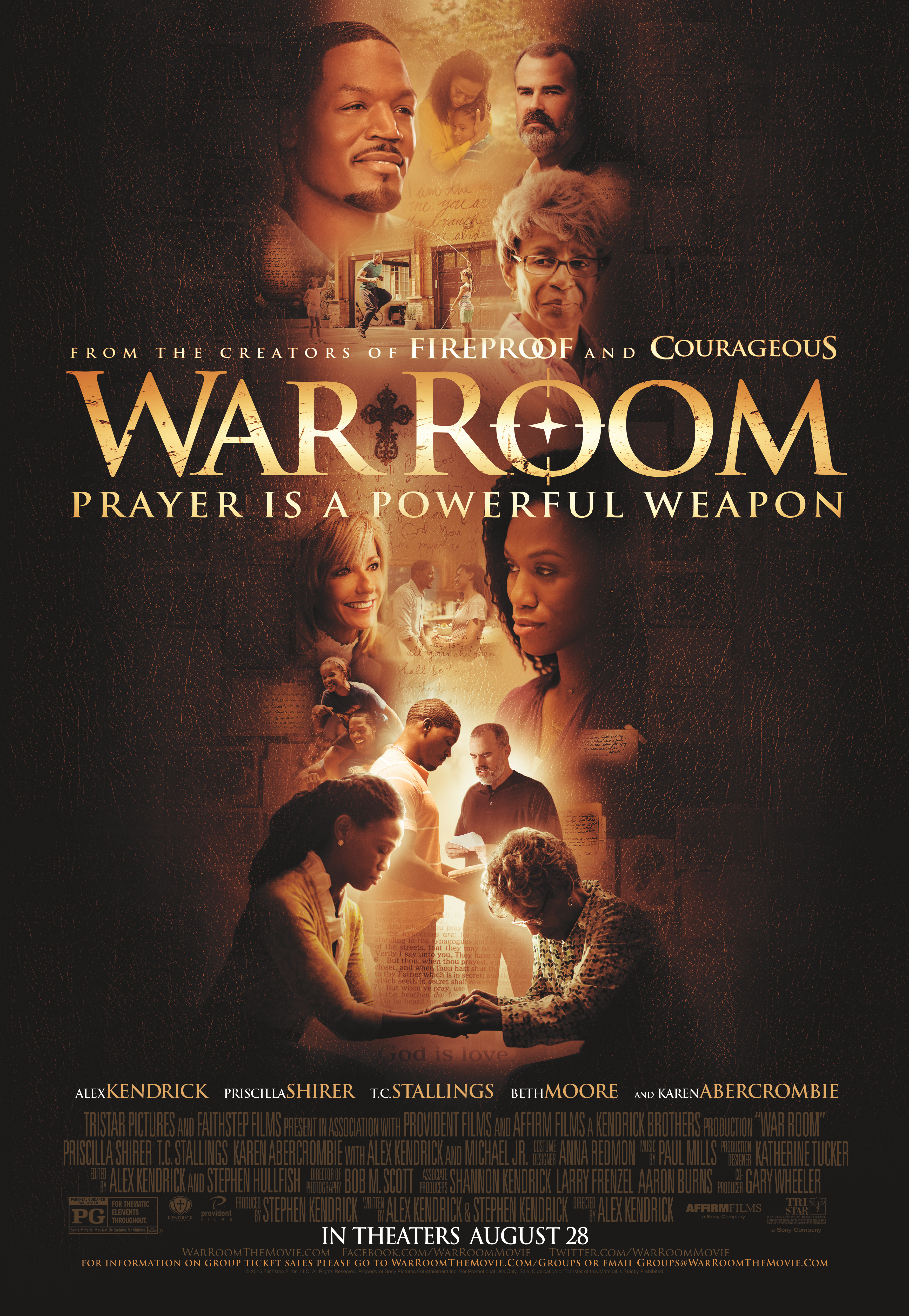War Room (2015): A Looking Closer Film Forum

When War Room, the latest movie by the Kendrick brothers (who also made Facing the Giants), scored the #1 spot at the box office — on a very weak moviegoing weekend, with little in the way of competition — the film's media campaign became celebratory, as if this was some kind of major victory for Jesus.
"This might be the biggest upset since David grabbed his slingshot!" proclaimed a poster on social media.

And then, making a bad thing worse...
"Are you ready to battle the right way? Grab your friends and family and see War Room today!"
That pretty much resolved things for me: I have no desire to see anything that uses such tactics to get attention.
I really don't understand this ad. In this scenario, who is Goliath? Who is the Enemy of God in their fantasy?
And in what way are they like the One Chosen to Lead the People of God?
(I like Dean Batali's response on Facebook: "Does this mean War Room is going to grow up and have an affair with Bathsheba?")
When we recast the Gospel as "us" versus "them," we unplug the power of the Gospel. What is the Gospel's claim, after all? That Jesus's love was victorious in a "battle" was between God's love and the Devil's chief weapon: death.
And that battle is over. Once and for all.
The battle is not between Christians and society. As a matter of fact, the "full armor of God" that believers are called to put on is made of love, truth, and righteousness — subverting any concept that we are to seek victory in material terms (the box office least of all).
All of that to say — I won't see the Kendricks' film because I want I try to focus on films that offer beauty and truth. And it would be painful to see a false gospel proclaimed.
And this really sounds like a false gospel. Some respectable and insightful Christian voices are going a long way to convince me of that.
•
Here's John Mark Reynolds at his blog Eidos on War Room. And before any fans of the movie write him off as a ranting anti-Christian, you might want to see who he is first.
He writes:
War RoomWar Room holes are very great. Trust me. If you steal drugs and money for your stash, you will go to jail.
War Room
If you enjoyed the film, I am not saying you are wrong to enjoy it. Enjoy. Yet know this: the fact that so many Christian films are wretched, overly written, and full of religious jargon is harming this generation. Do you want to know one reason for people leaving the church?
•
My friend Allison Smythe made this comment on Facebook, but I think it's worth sharing as a post of its own. (I'm breaking it into paragraphs for easier reading.) Allison's talking about the storyline of War Room, in which a woman solves the problem of her abusive husband by "submitting" and praying a lot. Allison says:
h sanctioned imbalance of power which include denial, rationalization, appeasement, minimizing harmful behavior, and manipulation. The movie presents Jesus as a sanitized and efficacious version of those techniques.
Had the 'genie prayer' not worked for another decade, what further amount of damage should she and her child have endured? "It was for freedom that Christ set us free," not another sanctioned version of bondage.
If this movie sparks this desperately needed dialogue in the church it's at least good for that. Christians can be so terrified of hard conversations and of being shown up. Offended by language? Offended by writing technique? What great excuses to evade the heart of the matter. Get your outrage in perspective. Then those outside the church might one day find you honest enough to give you a listen.
•
Joel Mayward published a post called "The 'Faith' of Faith-Based Films: On Moralistic Therapeutic Deism in Christian Movies." Referring to the film's enthusiastic Christian fans, he says
I feel encouraged, even convicted to pray more. And who are you to speak judgmentally and negatively about other Christians and what God is trying to do through their work? God inspired me and changed my life through this movie. How dare you question that?"
Well, I dare question it. I think it's dangerous when we stop the questioning regarding our faith and our art. (It's equally dangerous when we only question and never come to any solid conclusions or ground our feet in good theology and relationship with the Creator). More importantly, it raises a larger question, one about the relationship between personal experience and sound theology:
If someone believes an experience to be good, and it inspires them to genuinely follow God more, does that make it true?
If I come to a personal conclusion that is ultimately good--at least in my eyes--does it really matter how I got there? Why criticize the process if the end result is beneficial? Perhaps the ends justify the means.
...
The response of "I liked it, so stop critiquing it" may be an indicator that our faith is placed in something less than the death-and-resurrection power found in Jesus and the reign of his kingdom values in our world.
•
I'm not familiar with Jon Ellis, but his passionate critique of the Kendrick brothers' oeuvre sums up much of what has troubled many of my fellow Christians about the Kendricks' work:
Facing the Giants
Then, responding to urges from his readers to go see War Room and comment on it, he sees the movie and is overwhelmed by how much he has to say about its failures as a movie:
War Room War Room, War Room War Room
Sadly, many Christians are ok with that. They, too, have bought into the lie that function in art washes away the sin of bad form.
•
Okay, now let's move on to what the movie looks like to people who have devoted themselves to discerning what is excellent, mediocre, and lamentable in the art of cinema.
Here's Scott Renshaw in Salt Lake's City Weekly, whose reviews I've often appreciated:
War Room
Then he elaborates at Letterboxd:
The Return of the King of Kingsreal
And lo — the great Richard Brody in The New Yorker:
The societal divisions and exclusions that the movie perpetuates are, rather, those of class, of money. There are no poor people in “War Room,” with the exception of the off-screen character of Elizabeth’s sister and unemployed brother-in-law, who are seeking to borrow money for rent and a car payment (though even their poverty is presented as temporary and readily reparable). The entire movie takes place between comfort and luxury; economic success comes off as the great unifier.
Kendrick doesn’t preach the gospel of wealth; he also doesn’t suggest the trials of faith arising from the wearying struggles of unrelenting poverty. The religion of “War Room” is a religion without sacrifices—except for attitude.
